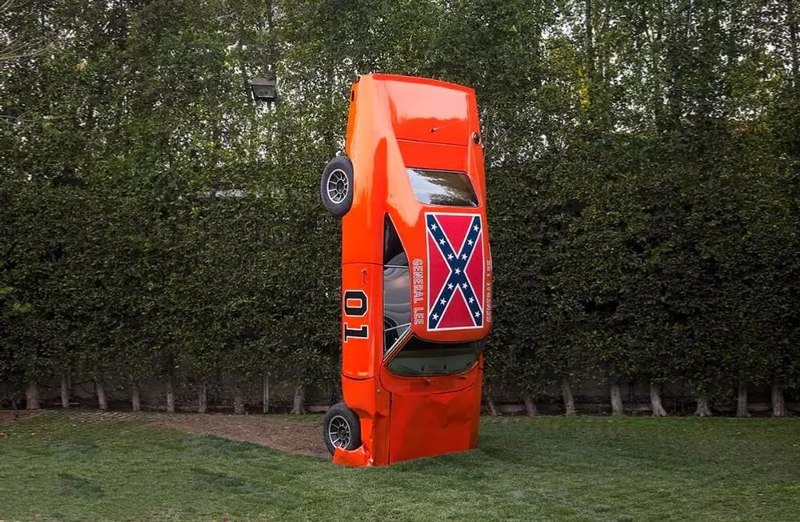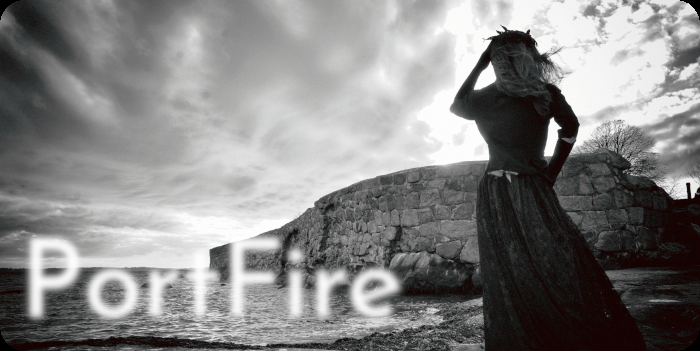
Hank Willis Thomas – A Suspension of Hostilities, 2019
According to my father, because I refuse to respect the Confederate flag, I am a traitor to my family and my Southern heritage. Considering how many of our ancestors fought the British for independence, including some who were Free People of Color in North Carolina, I disagree.
He argues that while they were filming the Dukes of Hazzard, during the late seventies to mid eighties, the General Lee and its flag were not considered racist. They were just harmless symbols of cultural pride, meant for good old boys and other underdogs in the South. He says that because the use of those symbols wasn’t intended as racist, it shouldn’t be taken as such, and we should allow the show the naivety of its time. “It was only after Charlottesville and Charleston that controversy started,” is one of his canards.
If he would listen to Black people, which he has yet to do, he would learn that they’ve never liked that flag, long before Charlottesville and Charleston, because the KKK uses it and the good old boys flying it are usually mean-ass racists. I think he knows this, deep down, but he denies it. He gas-lights himself and gets mad when others won’t join him. Intergenerational trauma in action again. Some of our ancestors gas-light themselves into being “pure whites” instead of the mixed people they were.
He also argues the flag’s meaning depends on context. This puts the responsibility on Black people to spend their time deciding which displays of that flag are hateful and which are not. Why on Earth would they want to do that? Because white people have been so kind and understanding towards them through the years?
My father and his fans can fly the Confederate flag. I wish they wouldn’t, but they have the right to. We didn’t ban it, the way the Germans banned the Nazi flag. (We should have.) But it should not fly in federal or state or local government offices. We had a whole war about it, and their side lost.
So what to do with the Dukes of Hazzard—should replays of the show be banned? And what about all the merchandise that Ben and Alma now sell in their stores? Do I expect them to give up their living?
I wish my father could be proud of his acting career, and the fame and money he earned and continues to earn through the Dukes, while also acknowledging that the show has problematic elements. For example, Hazzard County exists in a whites-only South (with a few exceptions) with obvious nostalgia for the Confederacy. The show rarely allows Black people into its world.
Ben and Alma could also sell products without divisive symbols and still do very well. Cooter’s is a strong enough brand on its own. Dolly Parton learned that lesson. But he is a true believer in the Lost Cause, and he will never, ever, admit to being wrong. I don’t think Alma is a true believer in the same way he is, but she is mean, and their business allows her to channel that meanness in a highly profitable way.
***
The only time I took my wife Christine (Catholic, Irish-American, New Yorker) to visit Ben and Alma in Virginia, the four of us went out to brunch. Of course he spent the entire time baiting her about the Confederate flag. Of course I had prepared Christine for this.
For years prior, I tried to put boundaries in place with my father, so we could have respectful conversations. I begged him to stop talking about politics with me, to stop pressuring me to agree with him. He couldn’t or wouldn’t. He knows I disagree with him, profoundly, 99% of the time on 99% of the things. We’ve butted heads since I was a toddler, because I’m as stubborn as he is, even if I’m not big or famous or loud.
If he could tolerate a disagreement with me, we’d still be speaking. I can tolerate him when he thinks differently than I do, even when he is profoundly wrong, because I do love him and I know that he is damaged. But he has never granted me freedom of speech, the very freedom he claims to be a warrior for. He has never respected my boundaries, because he never accepted that I have a right to them. He truly believes that I’m not allowed to say no to him, or to challenge him, because I’m his daughter. These are his “traditional family values.”
Yet another example of how intergenerational trauma works: generations of men treating wives badly, while devaluing daughters and depriving them of agency. Misogyny passed down man to man in our family, from Ben back to Big Buck and Daniel Stephens and so on. This version of masculinity requires the subordination of women. Why does my father treat his daughters differently than his son? It’s good old Southern sexism. We’re not worth as much.
Because Christine was there, and we were in public, our brunchtime conversation did not devolve into the usual shouting match. This created a rare opening for me: I told Ben and Alma that the Confederate flag is bad for America, and they had to listen. Alma acknowledged that it is “divisive” while my father for once held fire. But that was that. They know that their brand is divisive, but they are not going to change their business model. Their attitude is: if Cooter’s Place ain’t broke (in terms of capitalism) don’t fix it. Such patriotism.
***
In 2018, when my relationship with my father started falling apart (again), I published an essay about it here on Portfire. I published additional essays here in 2019 and 2020, after our relationship became untenable. I didn’t send any of these to him; someone else did. I knew he would react badly, even though I pulled my punches from beginning to end. He can’t bear it when I disagree with him in person, and he can’t bear it in print either. Someone told me that he found my writing “devastating.”
I wasn’t able to write about him again until now. My father will always have a powerful hold on my unconscious—I’m 50% him after all. His hold on me manifests in various self-sabotaging ways, like addictions or creative blocks or Twitter fights with NeoConfederates.
I reread my old essays now and what I notice is their lack of rancor. In 2020, I felt more compassion for him, or maybe I just made more excuses for him. A lot has happened in the past five years. I’m angrier now because I’ve done some digging and I’ve done some math. I’ve put together some puzzle pieces of my past.
I know my father is incapable of asking critical questions of himself. But I wonder if Alma is ever honest with herself about the damage that they are doing, or the heavy karma they are accruing. I wonder if any of my step-siblings ask themselves these questions. I’m glad to have not just burned but firebombed my bridges with them. I want no part of the family business, selling Confederate merchandise, because I want no part of that karma. I already have enough karmic debt, from my own stupid mistakes in this lifetime!
My mother, who grew up on a dairy farm, knows far more about being “Country” than Ben or Alma ever will, despite their posturing. Their lifestyle is a facade. Neither can milk a cow or make jam or handle a tractor. They certainly can’t shoot, skin, and butcher a deer like my mother’s mother did. My grandmother Landyce knew how to survive off the land because she had to. Ben and Alma only know how to pay country people to do things for them, when they want them. They’ve created a simulacra of rural living and family values.
***
I learned about Alma and my sister at the same moment. I was hot-messing and train-wrecking my way through my sophomore year of college. There was a letter in my campus mailbox, a long one, from Roberta Walker, Vivian’s mother, my father’s former mother-in-law.
Roberta was a tiny red-headed hillbilly who grew up in an orphanage during the Depression. She almost killed me many times, not out of meanness, but out of blindness, making wild turns into oncoming traffic, which in Atlanta was always five lanes across. Yeehaw!
I wish I kept that letter. I do remember the highlights: my dad was stepping out on Vivian with Alma, “a hard woman” he’d met in Washington D.C. while serving in Congress. Roberta could tell she was hard from her face. (Roberta was not wrong, about that and many other things.) She also told me about a sister, seven years younger than me. It was a lot to process.
My younger sister’s story is not mine to share. She is a private person who stays off social media. She didn’t have much of anything growing up, not nearly as much as me or our brother. She is far more forgiving about that than I am.
I recently reread my father’s memoir while preparing to write these pieces. There was erasure and obfuscation throughout that I missed on prior readings. Let me say that another way: he lied his ass off when he wrote that book. And he left many important things out.
He wrote 300 pages about his life, and his three kids each get one paragraph. One. Then he’s back to boasting about his amazing adventures and dropping famous name after famous name (Ava Gabor! James Brown! Princess Fergie!) while we disappear, resurfacing only briefly as his biggest fans at the end, one more sentence for the three of us.
The message has always been clear: he is fascinating, we are not; he is special, we are not. If we want to earn his attention, we better get busy and get famous or otherwise spectacularly successful. Nothing ordinary will do.
Fatherhood has always been a low priority for him. He was sober too when he made the worst decisions of his life, so he can’t blame his parenting skills on alcohol. There was no problematic substance at play except his character.
My father is not a farmer, historian, or soldier, things he imagines himself to be. He is a gifted entertainer and a talented writer. He is a wily business person. He has many strengths that he can be proud of. But he is also an absolute fool, just like me, and he shames us both when he forgets that. And he certainly shouldn’t be trying to sell “family values”—not with his history. Good times? Sure. “Traditional” morals and ethics? It would be funny if the Devil wasn’t laughing all the way to the bank.

Reader Comments
I always knew there were issues regarding your father. So sorry you were given that challenge at such a young age. However, thanks to your Mom and your own knowledge and strength you have climbed over those challenges and made a wonderful life for yourself. I know it has been years, but stop by if you are nearby. I’ve moved about 1/2 mile from where I used to be.
thank you so much Robin. I’m so grateful to you for the music lessons. You were an excellent teacher and always so kind.